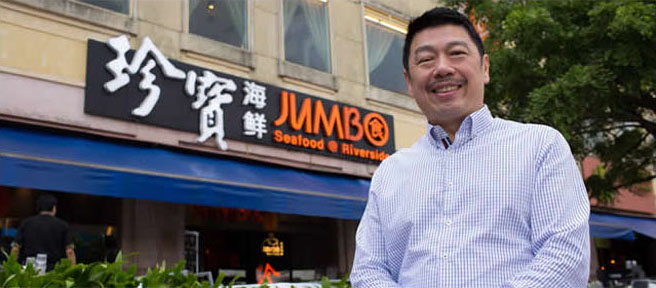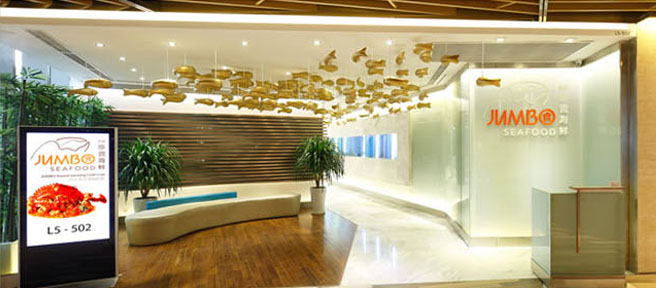
By the mid-1990s, about a decade after its first restaurant opened its doors at East Coast Parkway, Jumbo Seafood — and its famous crab dishes — has become a household name in Singapore.
“Jumbo became profitable and popular very quickly,” said CEO Ang Kiam Meng, whose father was one of the founders of the seafood chain. “We focused on providing good food and good service, and our reputation grew.”
Flush with this domestic success, and recognising the competitiveness and limited size of Singapore's Food & Beverage (F&B) market, the company yearned to venture overseas. That led Jumbo to open its first international restaurant in Indonesia in 1995.
The attempt, however, was a huge flop.
“We failed,” said Mr Ang, with a chuckle. “It was all due to our inexperience in opening branches (overseas). These were earlier years of training. The school fees we had to pay.”
Following this early defeat, it took Jumbo almost 20 years before it tried to go overseas again. It was only in 2013 that the company opened its second international outlet – this time in Shanghai.
Almost immediately after its inaugural Chinese launch, it became clear that the company's second stab at overseas expansion was going to take a decidedly different turn from the first: Jumbo is now thriving in China.
In less than three years, the company has opened three outlets in Shanghai, all well-received by both critics and customers alike.
So, what changed? According to Mr Ang, almost everything.
“(In China) we took a very different approach,” he said. “You know, once bitten, twice shy, so we were extremely careful. When it comes to F&B, you have to be patient. If you rush into it, if you don't do your homework well, it will all go down the drain in less than six months.”

Jumbo conducted extensive market surveys prior to choosing China as their target market, and engaged a consultancy company who helped them conduct focus groups research. The restaurant chain also approached IE Singapore (now Enterprise Singapore¹), which helped it navigate the complexities of the Chinese market and connected the company with local contacts.
“In Indonesia, we hadn't been aware of IE,” said Mr Ang. “But in China, they helped us in various ways… They were very helpful. When you're in a foreign land, you know very little about the place and so every help you can get is important, no matter how big or how small. IE helped us get a good start and avoid early struggles.”
Getting a good headstart, he stressed, is crucial in an overseas venture.
“It's important,” he said. “Otherwise, you end up being very unproductive and if you make mistakes, precious resources are wasted.”
A focus on strong branding and public relations (PR) has also been critical to Jumbo's success in China.
When the company opened its first outlet in Shanghai, it simultaneously went through an “internal rethink and restructure,” he shared, which involved improving its branding strategy.
“It's very important for companies to take stock internally. Every five years, you need to look back and tidy up the back of the house before you move on,” he added.
In 2014, Jumbo was also involved in IE's (now Enterprise Singapore) year-long PR project in Shanghai, which served to promote greater awareness of Singapore's F&B industry among Chinese consumers and local media.
It was an initiative that Mr Ang called “very important” for boosting Jumbo's reputation locally in Shanghai.
“PR is very different from advertising as it tends to be more neutral and [thus] more convincing. It's a very good move for companies,” he said. “It's actually helped Jumbo a lot.”
Eye on the prize
Jumbo has a unique plan for overseas expansion too. In view of their success in Shanghai, Mr Ang wants to “focus on Shanghai and really (flesh out) all the opportunities there” before venturing elsewhere.
Eventually, he sees them expanding to other parts of China and other countries too.
“If I open 10 shops, I'd rather open them in one city than in 10 cities. I want to focus on doing one thing first. That way, I can maximise human resources, and do a really good job,” he explained.
“In the next three to five years, we want to establish our name in Shanghai. People from all parts of China and, really, all over the world come to Shanghai for business and for leisure, so it's a good platform for us to highlight our brand.”
The ‘Four-Grade Philosophy'
Ultimately, Mr Ang credits a commitment to excellence as being the underlying factor for Jumbo's continued success — not just overseas, but domestically too.
“It's very easy, though expensive, to open a restaurant; but it's very hard to run a successful restaurant,” he said.
There are four ingredients to success, which he calls “our four-grade philosophy”.
"It's great food, great service, great value and a great environment — in that order. The quality of food is of the utmost importance. Take a hawker stall. A hawker might be abusive and the environment is not great, but people are willing to queue up because the food is good,” he said.
“If you have these four (elements), especially the first two, you'll be successful.”
Looking to test the waters overseas with your business? Enterprise Singapore can open doors to help you save precious resources and time.
Read all stories here.

